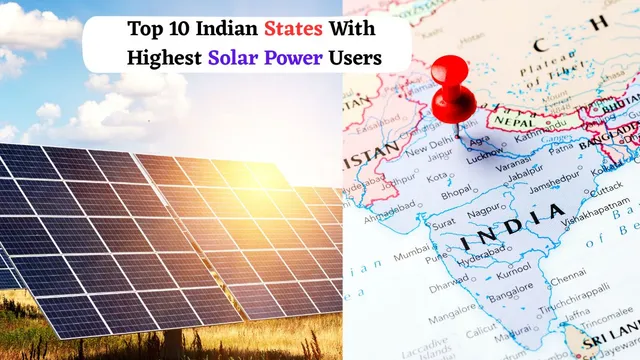- By Aditi Priya Singh
- Tue, 19 Aug 2025 05:51 PM (IST)
- Source:JND
Top 10 Indian States With Highest Solar Power Users: In terms of renewable energy, India is among the countries with the quickest rates of growth and solar power is largely responsible for this change. With year-round sunlight, India has made great efforts in utilising solar energy to lessen its reliance on fossil fuels and fulfil its expanding electrical demands. Rising public awareness, state-level projects and government initiatives have all contributed to the remarkable rate of growth in solar adoption.
Several Indian states are already setting the standard by establishing rooftop solar projects, expansive solar parks, and rural solar electrification initiatives. In addition to providing sustainable energy, these initiatives are lowering pollution, generating new jobs, and lowering electricity bills. The largest donors are undoubtedly Rajasthan and Gujarat, but other states like Maharashtra, Tamil Nadu, and Karnataka are rapidly catching up.
Top 10 Indian States With the Most Installed Solar Power
On this list, we will look at the top 10 Indian states with the highest solar users, highlighting their installed capacity and how they are shaping the future of green energy in India.
| No. | State | Installed Solar power (MW Ac) |
|---|---|---|
| 1. | Rajasthan | 142,310 megawatt |
| 2. | Maharashtra | 64,320 megawatt |
| 3. | Madhya Pradesh | 61,660 megawatt |
| 4. | Andhra Pradesh | 38,440 megawatt |
| 5. | Himachal Pradesh | 33,840 megawatt |
| 6. | Odisha | 25,780 megawatt |
| 7. | Karnataka | 24,700 megawatt |
| 8. | Uttar Pradesh | 22,830 megawatt |
| 9. | Telangana | 20,410 megawatt |
| 10. | Chhattisgarh | 18,270 megawatt |
Source: Niti Aayog India Energy
1. Rajasthan
Rajasthan is the leading state in solar power users, with over 1.42 lakh users. The state’s hot climate and vast desert land make it perfect for solar energy adoption. From rural households to large farms, Rajasthan is setting an example in using clean energy for daily needs.
2. Maharashtra
Maharashtra has more than 64,000 solar users, making it one of the top states for renewable energy. Cities like Pune, Nagpur, and Mumbai are adopting rooftop solar systems, while rural areas use solar for agriculture and electrification.
3. Madhya Pradesh
Madhya Pradesh has 61,660 users benefiting from solar energy. The state has promoted solar adoption in villages and towns, helping people reduce electricity costs while contributing to a cleaner environment.
ALSO READ: Top 10 Solar Power Countries In The World In 2025
4. Andhra Pradesh
Andhra Pradesh records 38,440 solar users, focusing strongly on rural electrification and irrigation. Many farmers in the state are using solar pumps, which help save electricity bills and ensure sustainable farming.
5. Himachal Pradesh
Himachal Pradesh has 33,840 solar users, showing that even hilly states are embracing clean energy. Many homes, schools, and offices in the state use rooftop solar systems to meet daily power needs.
6. Odisha
Odisha is home to 25,780 solar users, steadily moving toward renewable energy adoption. The state has encouraged the use of solar in both urban and rural areas, helping communities access reliable electricity.
7. Karnataka
Karnataka, with 24,700 users, is already known for its large solar parks, and now households and industries are also embracing solar energy. The state has made solar power an important part of its energy mix.
8. Uttar Pradesh
Uttar Pradesh has 22,830 solar users, many of them in rural and semi-urban areas. Rooftop solar systems and solar streetlights are widely used, making solar power a growing trend in the state.
9. Telangana
Telangana has 20,410 solar users, thanks to government programs that encourage people to adopt solar. The state is promoting solar usage among farmers, schools, and small industries to make energy affordable and clean.
10. Chhattisgarh
Chhattisgarh has 18,270 solar users who are switching to green energy solutions. The state is focusing on using solar for homes, villages, and farming, helping reduce dependency on traditional electricity sources.

